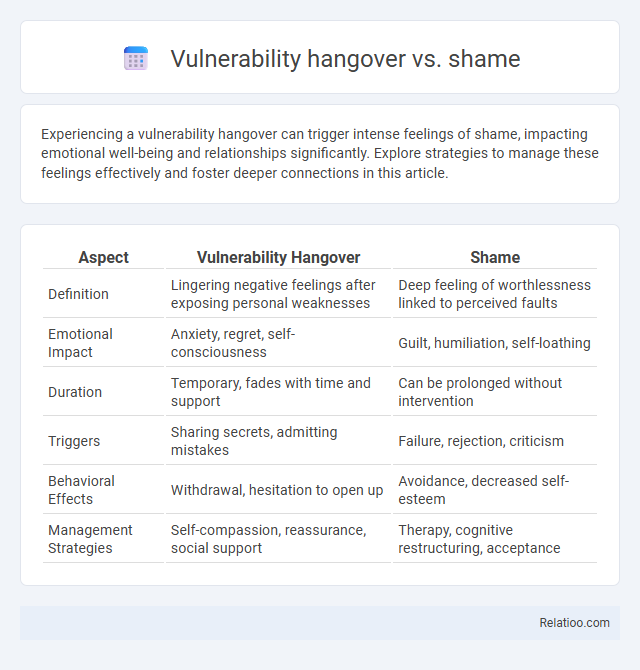Experiencing a vulnerability hangover can trigger intense feelings of shame, impacting emotional well-being and relationships significantly. Explore strategies to manage these feelings effectively and foster deeper connections in this article.
Table of Comparison
| Aspect | Vulnerability Hangover | Shame |
|---|---|---|
| Definition | Lingering negative feelings after exposing personal weaknesses | Deep feeling of worthlessness linked to perceived faults |
| Emotional Impact | Anxiety, regret, self-consciousness | Guilt, humiliation, self-loathing |
| Duration | Temporary, fades with time and support | Can be prolonged without intervention |
| Triggers | Sharing secrets, admitting mistakes | Failure, rejection, criticism |
| Behavioral Effects | Withdrawal, hesitation to open up | Avoidance, decreased self-esteem |
| Management Strategies | Self-compassion, reassurance, social support | Therapy, cognitive restructuring, acceptance |
Understanding Vulnerability Hangover: Definition and Signs
Understanding Vulnerability Hangover involves recognizing the emotional and physical exhaustion following an intense experience of openness that leaves individuals feeling exposed or regretful. Key signs include lingering anxiety, self-doubt, and a persistent sense of embarrassment or shame related to perceived social risks. Differentiating vulnerability hangover from shame highlights that vulnerability hangover encompasses the aftermath of overexposure, while shame specifically relates to feelings of worthlessness or failure tied to one's actions or identity.
What Is Shame? Key Differences from Vulnerability Hangover
Shame is a deeply negative emotion characterized by the belief that you are fundamentally flawed or unworthy, often leading to feelings of isolation and self-criticism. Unlike a vulnerability hangover, which results from overexposure or regret after sharing personal feelings, shame directly attacks your core self-esteem and identity. Understanding these key differences helps you differentiate between temporary emotional discomfort from vulnerability and the more pervasive, damaging impact of shame.
The Psychology Behind Vulnerability Hangover
Vulnerability hangover occurs when Your emotional exposure leads to feelings of regret and self-doubt after expressing personal truths, distinct from shame, which involves a deep sense of worthlessness. The psychology behind vulnerability hangover reveals that emotional discomfort arises from fearing negative judgment rather than internalizing a negative self-view. Understanding this distinction helps manage the emotional aftermath and promotes healthier vulnerability experiences.
Common Triggers of Vulnerability Hangover
Common triggers of vulnerability hangover include oversharing personal information in emotionally charged situations and receiving unexpected negative reactions after opening up. Experiences of shame often amplify these triggers by heightening self-criticism and fear of judgment, making the vulnerability hangover more intense and prolonged. Recognizing these triggers helps differentiate the emotional aftermath of vulnerability hangover from shame, focusing on external responses versus internal self-perception.
How Shame Manifests in Everyday Life
Shame often manifests through self-critical thoughts, social withdrawal, and reluctance to express true emotions, leading to a diminished sense of self-worth. Unlike a vulnerability hangover, which is the regret or discomfort following an act of openness, shame deeply embeds feelings of inadequacy and unworthiness into daily interactions. Recognizing these signs is crucial for breaking the cycle of negative self-perception and fostering emotional resilience.
Vulnerability Hangover vs Shame: Core Distinctions
Vulnerability hangover refers to the lingering emotional discomfort after exposing personal feelings or weaknesses, whereas shame involves a deep sense of personal inadequacy and self-judgment. The core distinction lies in vulnerability hangover being a temporary emotional state triggered by vulnerability, while shame is a more entrenched, identity-based feeling that impacts self-worth. Understanding these differences aids in emotional resilience and healthier self-compassion practices.
Emotional Impact: Navigating Vulnerability Hangover and Shame
Vulnerability hangover causes emotional exhaustion and regret after sharing deep feelings, while shame triggers a profound sense of worthlessness and self-judgment. Your emotional impact intensifies when vulnerability hangover overlaps with shame, amplifying feelings of exposure and diminishing self-esteem. Navigating these emotions requires self-compassion and recognizing that vulnerability is a strength, not a weakness.
Coping Strategies for Vulnerability Hangover
Vulnerability hangover occurs when you feel regret or self-doubt after opening up emotionally, while shame intensifies this by adding a sense of unworthiness or failure. To cope with vulnerability hangover, practice self-compassion, affirm your courage, and remind yourself that vulnerability builds genuine connections. Developing mindfulness techniques helps you stay present and reduces the negative impact of these feelings on your emotional well-being.
Healthy Ways to Address and Overcome Shame
Experiencing a vulnerability hangover often leaves Your emotions overwhelmed, while shame intensifies these feelings by triggering self-criticism and isolation. Healthy ways to address and overcome shame include practicing self-compassion, seeking supportive connections, and engaging in reflective journaling to reframe negative self-perceptions. Building resilience through mindfulness and open communication fosters emotional recovery and diminishes the lasting impact of vulnerability hangovers.
Building Resilience: Embracing Vulnerability Without Shame
Experiencing a vulnerability hangover often triggers feelings of shame, making it challenging to embrace your authentic self. Building resilience involves recognizing vulnerability not as a weakness but as a strength that fosters connection and growth. You can overcome a vulnerability hangover by reframing your mindset to accept imperfections without shame, promoting emotional healing and self-compassion.

Infographic: Vulnerability hangover vs shame
 relatioo.com
relatioo.com